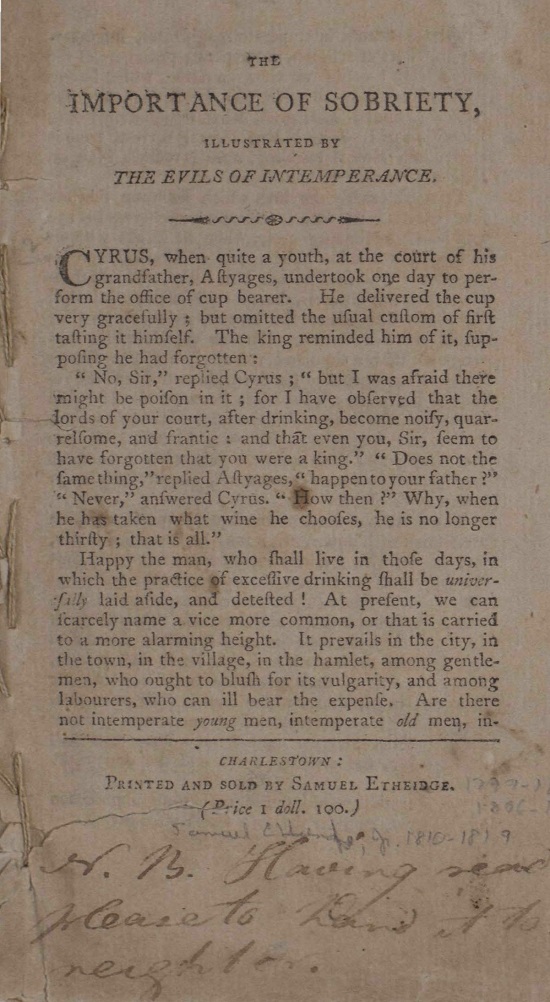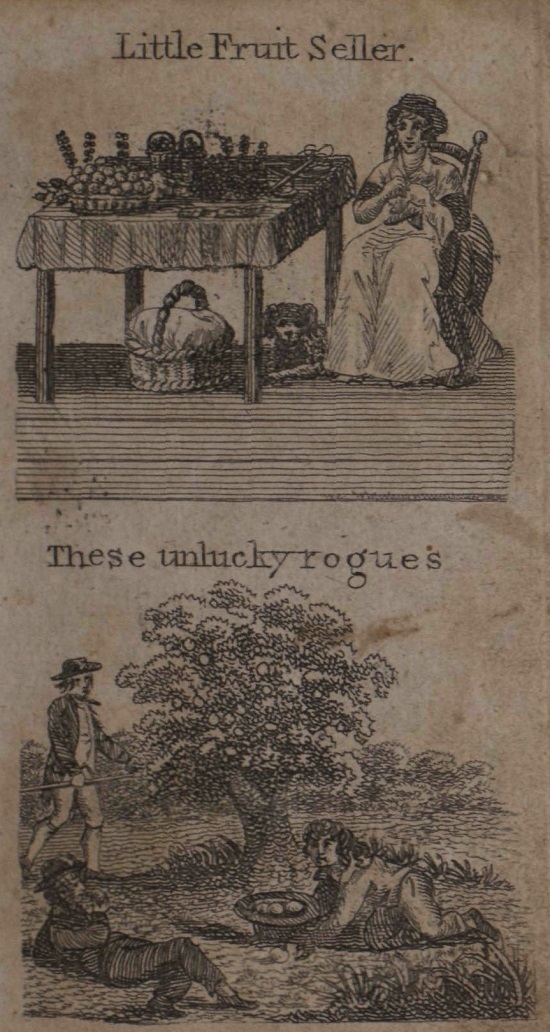Ye Spleeny Folks: Highlights from the Most Recent Supplement to Early American Imprints, Series II
The July release of Early American Imprints, Series II: Supplement 3 from the American Antiquarian Society, 1801-1819, includes three anonymous works discussing sobriety, levity, and the cost of crime.
The Importance of Sobriety: Illustrated by the Evils of Intemperance (1802)

This imprint concerns itself with “the evils of intemperance” and begins with this anecdote:
Cyrus, when quite a youth, at the court of his grandfather, Astyages, undertook one day to perform the office of cup bearer. He delivered the cup very gracefully; but omitted the usual custom of first tasting it himself. The king reminded him of it, supposing he had forgotten.
“No, Sir,” replied Cyrus; “but I was afraid there might be poison in it; for I have observed that the lords of your court, after drinking, become noisy, quarrelsome, and frantic; and that even you, Sir, seem to have forgotten that you were a king.”
The king goes on to ask if the same thing did not happen to Cyrus’s father:
“Never,” answered Cyrus…. ”Why, when he has taken what wine he chooses, he is no longer thirsty, that is all.”
Happy the man, who shall live in those days, in which the practice of excessive drinking shall be universally laid aside, and detested!
Expanding on his thoughts, the author continues:
There are two sorts of intemperate persons; some are flushed with liquor, or, it may be, drowned in riot, but it is not often; others exceed more frequently, but the symptoms are not so visible and gross; the first plead their general sobriety, the last challenge you to mention a single influence of brutal excess. They are both deceived, they are both slaves of appetite; the difference between them must be fought for in their palates, in the measure of their prudence, in the cast of their associates, in anything, rather than in their principles. Such a difference, we may easily suppose, will, in many cases, subside, and we shall see the same man reel through life, the constant tipler, and the downright drunkard.
The Repartee, or Comical Jester: Containing a Choice Selection of Anecdotes—Bon Mots—Jests—Comical Stories—Repartees &c. &c. (1803)

This jestbook “containing a choice selection of anecdotes—bon mots—jests—comical stories—repartees &c. &c.” begins with the following witticism:
A parson overtook a young wag upon the road, asked him if he could chop logic? Logic! said the wag, I do not know what it is. —Why, said the parson, it is to tell of a thing that is not so, and make it appear that it is so; Then said the wag your saddle is a mule. How can that be, retorted the parson? Because, said the wag, a mule is between a horse and an ass, and so is your saddle.
And found among the many equivoques are clever anecdotes, such as:
Not long since, as a couple were going to be married and had proceeded as far as the clergyman’s door, the gentleman stopping his fair comrade with the following unexpected address: “Mary, during our courtship I have told you most of my mind, but not all my mind; when we are married, I shall insist upon three things.”—What are they? asked the astonished lady. In the first place, said he, I shall lie alone; secondly, I shall eat alone; and lastly, I shall find fault when there no occasion; can you submit to these? “O yes, sir, very easily,” she replies, “for if you lie alone, I shall not; if you eat alone, I shall eat first; and as to finding fault without occasion, that I think, you may be prevented, for I will take care that you shall never want occasion.” They were married, and the writer of this wishes them much happiness.
A Trifle for a Good Girl: Ornamented with Fourteen Handsome Engravings (1803)

This children’s picture book includes poetry and stories and covers an array of topics including farm life, theology, and others. Among its parables is the ‘Little Fruit Seller.’
These unlucky rogues are throwing stones into an apple-tree, and what increases their fault is, that the apple-tree does not belong to them. See how one stoops to pick up the apples which have fallen off the tree; and the other lies carelessly on his back eating an apple. Some they eat, and then fill their pockets and hats in a shameful manner.
But they will soon be caught, for see, the owner of the apple-tree is coming with a great stick, to give them a good thrashing. This stealing of apples, or very trifling things, by young beginners, often leads them to a bad end. It is generally done by boys, who are either neglecting their learning, or are too idle to work; for did they attend to what they read at school they would be ashamed of such wicked practices.

For more information about Early American Imprints, Series II: Supplement 3 from the American Antiquarian Society, 1801-1819, please contact Readex Marketing.



